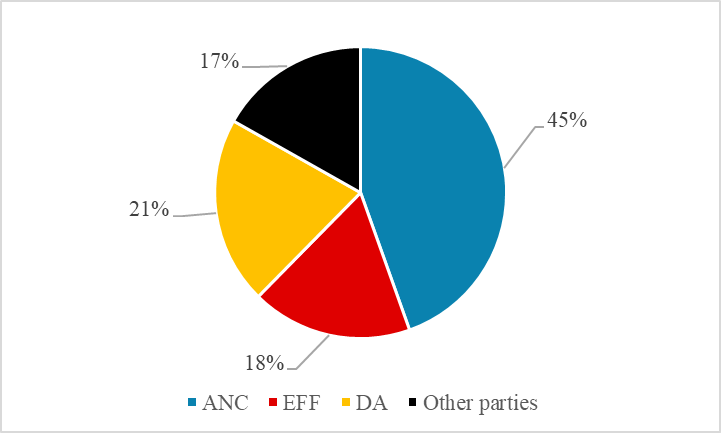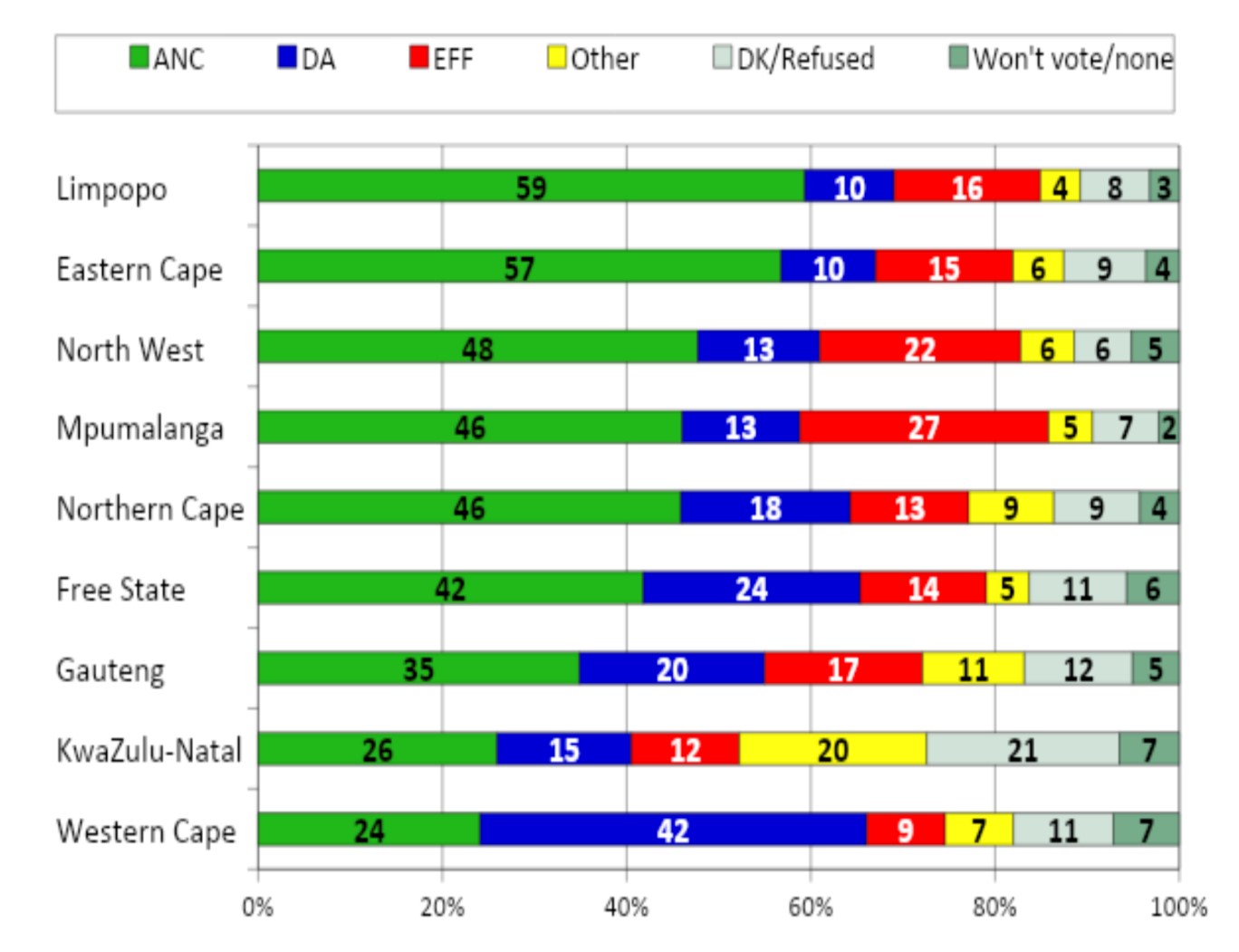South Africa: Two Major Scenarios for Post-Elections
Bottom line: We foresee two possible outcomes of South African presidential elections on May 29, either a African National Congress (ANC) win or a coalition government. It appears ANC is at the risk of losing its majority as the recent polls suggest support for the ANC has dipped below 50%. Unless something unforeseen occurs, we think the ANC will likely remain below the absolute majority, and a coalition will have to be formed, either with Democratic Alliance (DA) or with other smaller parties. The radical Economic Freedom Fighters (EFF) will be the key determinant of the election since the growing support to EFF continues to eradicate support to ANC. We see some moderate and temporary political volatility during and after the elections.
Figure 1: Vote Intentions Poll

Source: Ipsos
The latest opinion polls in South Africa show an ANC victory would be a surprise on May 29, and a likely ANC-led coalition with the DA and/or other smaller parties would probably run the government after May. Analysts expect that if the ANC gets less than 50%, it will go into coalition with other parties to stay in government and re-elect Ramaphosa for a second term.
According to the Ipsos’ survey in February (Figure 1), which was conducted face-to-face with 3,600 individuals, ANC would need a coalition partner with at least 4% to 6% national support to form a government. The DA would remain the chief opposition with 20% to 21% of the votes while EFF’s support ranges from 16.7% to 18.5%, compared with 10.8% in the 2019 election, showing EFF’s accelerated popularity.
On the basis of the results of the polls, we foresee two potential scenarios for the post-election. The first one, with 20% probability, is a clear ANC victory, with Ramaphosa managing the economy similar to his first term. The second one (with 80% probability) is an ANC led-coalition either with the DA and/or other smaller parties, which would likely be weaker than a one-party government at least for some time, and less able to undertake necessary fiscal reform policies and deal with power cuts (load shedding) – especially of the radical EFF poll over 15%. In both scenarios, the focus has to be the domestic economy, as the unemployment, corruption, load shedding and inequality remain major hurdles.
- (25%) ANC wins and pursue similar policies: ANC could still get a majority if a swing back to them is seen or polls are inaccurate – previous elections have seen ex ANC voters not voting for other parties but rather not voting at all. In this scenario, we believe that President Ramaphosa will keep the current policies implemented, with a stronger focus on socio-economic issues such as reducing unemployment, corruption and load shedding. Another focus will be strengthening government fiscal balance and increasing foreign investments into the country. (Note: According to the ANC manifesto, which was announced on February 24, the party promised to create 2.5 million work opportunities, eradicate corruption, and pledged to boost investment and support the private sector).
- (75%) ANC-Led Coalition: In this scenario, the coalition government will seek new policies around an ANC orientation. Taking into account that the country has ruled by the ANC since the end of apartheid, and coalitions at the local government level have mostly failed, we think the country getting used to being ruled by a coalition could take time as the decision making processes would probably slow. When taking into consideration that the DA promised to create two million new jobs, end the power cuts, accelerate privatization, especially in the energy sector, and halve violent crime in its party manifesto launched last week, a possible ANC and DA coalition could follow a more liberal framework, with a strong focus on private sector.
(Note: There's a very small chance the ANC may be out of government completely, but we deem it highly unlikely as the other parties should increase their shares considerably to collectively secure at least the absolute majority. (Less than 1% chance).
We think current economic issues will be one of the main determinants of the elections. ANC is under pressure as the country is struggling with macroeconomic problems like poverty, unemployment, inequality, weak public services, the rising cost of living and high corruption. Additionally, Ramaphosa has been heavily criticized of managing the economy badly. ANC’s popularity was also hurt due to record levels of blackouts as the electricity crisis along with logistical constraints, which continue to have broader negative effects on the cost of doing business and the cost of living. From the fiscal standpoint, the country still has need for large domestic and international financing.
Speaking about the ANC’s administration, the political leaders of DA and EFF remain critical against the current government. DA leader John Steenhuisen recently said “a countdown to a historic moment where South Africa has the opportunity to rescue itself from 30 years of ANC failure, corruption, and state capture.” The EFF officials continue to criticize ANC for reproducing and worsening apartheid economic inequalities and the party pledges to expropriate land without compensation and nationalise the mines, banks and other strategic sectors of the economy, without compensation, so that the wealth would be used to benefit the majority of the population. This radical agenda worries global investors, in case a weak ANC adopts some of these policies.
The political landscape on the opposition side remains complicated before the elections. It is worth mentioning that the main opposition party, DA, together with the Inkatha Freedom Party, the Freedom Front Plus and Action SA, and other smaller parties initiated a pre-election coalition called the Multi-Party Charter in order to oust the ANC from the government. (Note: Multi-party charter parties agreed they won’t work with the ANC or the EFF but it remains unclear whether any of them might renege on that commitment should their leaders be offered cabinet posts or other positions, in case of a coalition government). EFF, which is the third biggest party in Parliament, has an increasing popularity and it is not a part of the coalition mentioned. The party pursues radical far-left policies causing DA and EFF being far apart precluding them to take part under the same umbrella coalition. We think EFF will be the key determinant for the election, as the growing support to EFF continues to eradicate support to ANC. (Note: EFF was the only one of the three main parties to increase its share in the last general election in 2021). There is another possibility that ANC’s votes can also be hurt by the ANC’s former leader, Zuma, who formed another party called uMkhonto we Sizwe (Spear of the Nation) party in December. On the other parties’ front, many of the older smaller parties are dying off; and the remainder dividing tiny vote shares, according to political analysts.
When we look at the provincial breakdowns, WITS School of Governance’s study based on Change Starts Now (CSN) data (Figure 2) show that ANC would go below the 50% mark; the DA (19%) and EFF (16%) winning less than a fifth of the vote.
Figure 2: Provincial Breakdown of a National Poll of Voter Intentions

Source: WITS School of Governance
As we get closer to the May 29 election, we will provide an update on the probabilities and the likely consequences. As mentioned above, a coalition government at national level seems more probable, for the first time in the country’s history. We think a clear ANC victory would be a big surprise; but it seems the election outcome would be a close call particularly if ANC could regain some of its popularity between March and May. We see some moderate and temporary political volatility during and after the elections.